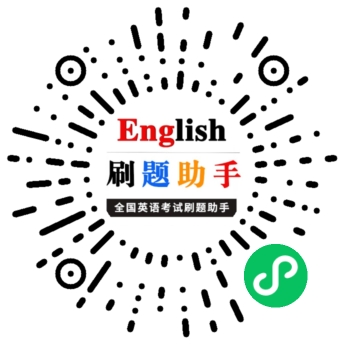2019年全国英语等级考试三级精选模拟试题四阅读B
The kids in this village wear dirty,ragged clothes.They sleep beside cows and sheep in huts made of sticks and mud.They have no school.Yet they all can chant the English alphabet,and some can make words.
The key to their success:20 tablet computers(平板电脑)dropped off in their Ethiopian village in February by a U.S.group called One Laptop Per Child.
The goal is to find out whether kids using today’s new technology can teach themselves to read in places where no schools or teachers exist.The Massachusetts Institute of Technology researchers analyzing the project data say they’re already amazed.“What I think has already happened is that the kids have already learned more than they would have in one year of kindergarten,”said Matt Keller,who runs the Ethiopia program.
The fastest learner—and the first to turn on one of the tablets—is 8-year-old Kelbesa Negusse.The device’s camera was disabled to save memory,yet within weeks Kelbesa had figured out its workings and made the camera work.He called himself a lion,a marker of accomplishment in Ethiopia.
With his tablet,Kelbasa rearranged the letters HSROE into one of the many English animal names he knows.Then he spelled words on his own.“Seven months ago he didn’t know any English.That’s unbelievable,”said Keller.
The project aims to get kids to a stage called“deep reading,”where they can read to learn.It won’t be in Amharic,Ethiopia’s first language,but in English,which is widely seen as the ticket to higher paying jobs.
1、What can we infer from Keller’s words in Paragraph 3?A.They need more time to analyze data.
B.More children are needed for the research.
C.He is confident about the future of the project.
D.The research should be carried out in kindergartens.
参考答案:C
参考解析:考查判断推理。Keller认为孩子们自学学到的知识比他们在幼儿园一年学的还多,这说明他对这个计划的前景是满怀信心的。故选C。
2、How does the Ethiopia program benefit the kids in the village?A.It trains teachers for them.
B.It contributes to their self-study.
C.It helps raise their living standards.
D.It provides funds for building schools.
参考答案:B
参考解析:考查细节理解。通过对文章的阅读可知,这个计划的目的是看看孩子们能否再没有学校和老师的情况下自学,通过这个计划人们发现这些孩子会背英文字母表,有的甚至会拼单词,这说明这个计划对孩子们的自学是有益的。故选B。
3、What is the aim of the project?A.To offer Ethiopians higher paying jobs.
B.To make Amharic widely used in the world.
C.To help Ethiopian kids read to learn in English.
D.To assist Ethiopians in learning their first language.
参考答案:C
参考解析:考查细节理解。由文章最后一段“The program aims to get kids to a stage called“deep reading”,where they can read to learn.It won’t be…but in English.”可知,这个计划的目的是帮助埃塞俄比亚的孩子学会用英语阅读。故选C。
4、It amazed Keller that with the tablet Kelbesa could _______.A.learn English words quickly.
B.draw pictures of animals.
C.write letters to researchers.
D.make phone calls to his friends.
参考答案:A
参考解析:考查细节理解。通过对文章倒数第二段的阅读可知,Keller对Kelbesa在短短七个月里从不认识英语到会拼写英语感到不可思议,故选A。
参考译文:
这个村子里的孩子们穿着又脏又破的衣服。他们睡在用木棍和泥搭成的棚屋里的牛羊旁边。他们没有学校。然而,他们都能唱英文字母表,有些人能造字。
他们成功的关键是:美国一个名为“每个孩子一台笔记本电脑”的组织于2月在埃塞俄比亚的一个村庄里投放了20台平板电脑。
其目的是找出使用当今新技术的孩子是否可以在没有学校或教师的地方自学阅读。麻省理工学院的研究人员分析了该项目的数据,说他们已经很惊讶了。埃塞俄比亚项目的负责人马特·凯勒说:“我认为已经发生的事情是,孩子们已经学到了比一年幼儿园学到的更多的东西。”
最快的学习者和第一个打开其中一个平板电脑是8岁的Kelbesa Negusse。该设备的摄像头被禁用以节省内存,但几周内,Kelbesa就发现了它的工作原理,并使摄像头正常工作。他称自己为狮子,是埃塞俄比亚成就的标志。
Kelbasa用他的平板电脑把字母hsroe重新排列成他所知道的许多英国动物的名字之一。然后他自己拼字。“七个月前他不懂英语。太不可思议了,”凯勒说。
这个项目旨在让孩子们进入一个叫做“深度阅读”的阶段,在那里他们可以阅读来学习。它不会出现在埃塞俄比亚的第一语言阿姆哈拉语中,而是出现在英语中,英语被广泛认为是获得高薪工作的门票。
本文标签:公共英语等级考试 模拟试题 2019年全国英语等级考试三级精选模拟试题四阅读B
转载请注明:文章转载自(http://www.ggyingyu.cn)
以上就是关于“2019年全国英语等级考试三级精选模拟试题四阅读B” 的全部内容,想获取更多公共英语等级考试的相关资讯,如公共英语等级考试常见问题、政策公告。 敬请关注“微信公众号”,第一时间获取报名报考资讯信息~

《公共英语等级考试网》免责声明:
1、由于各方面情况的调整与变化,本网提供的考试信息仅供参考,考试信息以省考试院及院校官方发布的信息为准。
2、本网信息来源为其他媒体的稿件转载,免费转载出于非商业性学习目的,版权归原作者所有,如有内容与版权问题等请与本站联系。联系邮箱:812379481@qq.com。


